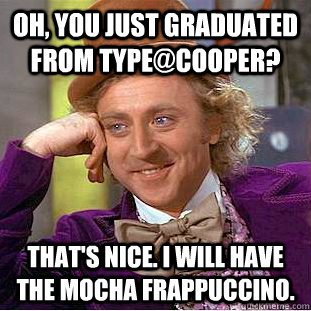The “Canberra Centenary $10,000 Typeface Design Competition”
Comments
-
I just checked the terms and conditions, looks like they've changed it. It now says:
5.2. The entrant awarded the $10,000 first prize in the competition will retain intellectual property rights in his or her entry and grants to the University of Canberra an exclusive, royalty-free and irrevocable licence for a term of three years commencing on the date of the announcement of the winning entry to use the winning typeface for the purposes of advertising or publicizing the City of Canberra and/or the University of Canberra (“exclusive licence”). On and from the date of expiry of the exclusive licence, the entrant grants the University a further non-exclusive, royalty-free, irrevocable, perpetual licence to use the winning entry for the same purpose (“non-exclusive licence”). No further payment will be made by the University for the exclusive and non-exclusive licence.
0 -
The plot thickens.... that is interesting.1
-
Nick, John, Indra: What I'm getting from you guys is that if you work hard and apply yourself, making money from Type Design should be un-difficult — (is Stephen Coles wrong in saying there's fewer than 300 fulltime type designers in the world though?)…
Probably off topic:
What's the likely reality for income being made from type design? People who do a bit of typeface design on the side? Or fulltime type designers? Are 300 type designers really getting the lion's share of Monotype's $149.9 million of revenue? Are graduates from KABK or Reading (or HGB, ECAL, ZHdK, Cooper Union and so on) who want to derive income from type design actually doing so?
I'd be interested to see data regarding income conditions for type design (with respect to age, experience, education level, geography etc). I'm sure it's fairly scant and probably lumped with graphic design data. Typophile sheds a little light.2 -
Why don't we invite someone from the committee to join our discussion?1
-
…if you work hard and apply yourself, making money from Type Design should be un-difficult…
In as much as the same could be said for other professions.
It’s not like you take a one-day Zumba certification course and bingo you’re in business.0 -
The user and all related content has been deleted.1
-
I agree that they ask too much work : why can't we just submit a few letters in one weight, they choose the aesthetics they prefer, and then pay the designer to develop the whole family?
That would have been fair I think.
Anyway, I am against free work of course, but in that case, I think you can still try to send your typeface, and then publish it by yourself if you are not the winner. It is a more like a reason to finish the design of a nice typeface in a limited time, with a vague enough brief so you can design whatever you feel, and that is what I plan to do, unless you tell me there is a small secret clause I didn't see in the competition rules.0 -
Emilie, do you what you think is right. Frankly, your work is good enough* that winning would be the greater curse. Yes, you’d get AUD 10,000. But you & your work will also be promoted by the University of Canberra as proof that soliciting spec work was the right idea. Justifications aside, anyone who enters a spec-work competition is endorsing spec work.
* I own a copy of Emilie's lovely Coline Extrême family.2 -
I think the difference of spec vs contest is clear, that the deliverables will be commercially used or not.0
-
That book is kinda scary.0
-
-
That chick is adorable! The designer deserves the $10K just for rescuing it. ;-)1
-
Separate story, but still a good one.0
-
Yes, but imagine how much better the story would have been if the type designer actually had rescued the baby bird!0
-
0
Categories
- All Categories
- 46 Introductions
- 3.9K Typeface Design
- 490 Type Design Critiques
- 569 Type Design Software
- 1.1K Type Design Technique & Theory
- 663 Type Business
- 868 Font Technology
- 29 Punchcutting
- 527 Typography
- 122 Type Education
- 326 Type History
- 79 Type Resources
- 112 Lettering and Calligraphy
- 33 Lettering Critiques
- 79 Lettering Technique & Theory
- 563 Announcements
- 94 Events
- 116 Job Postings
- 170 Type Releases
- 182 Miscellaneous News
- 278 About TypeDrawers
- 55 TypeDrawers Announcements
- 121 Suggestions and Bug Reports









